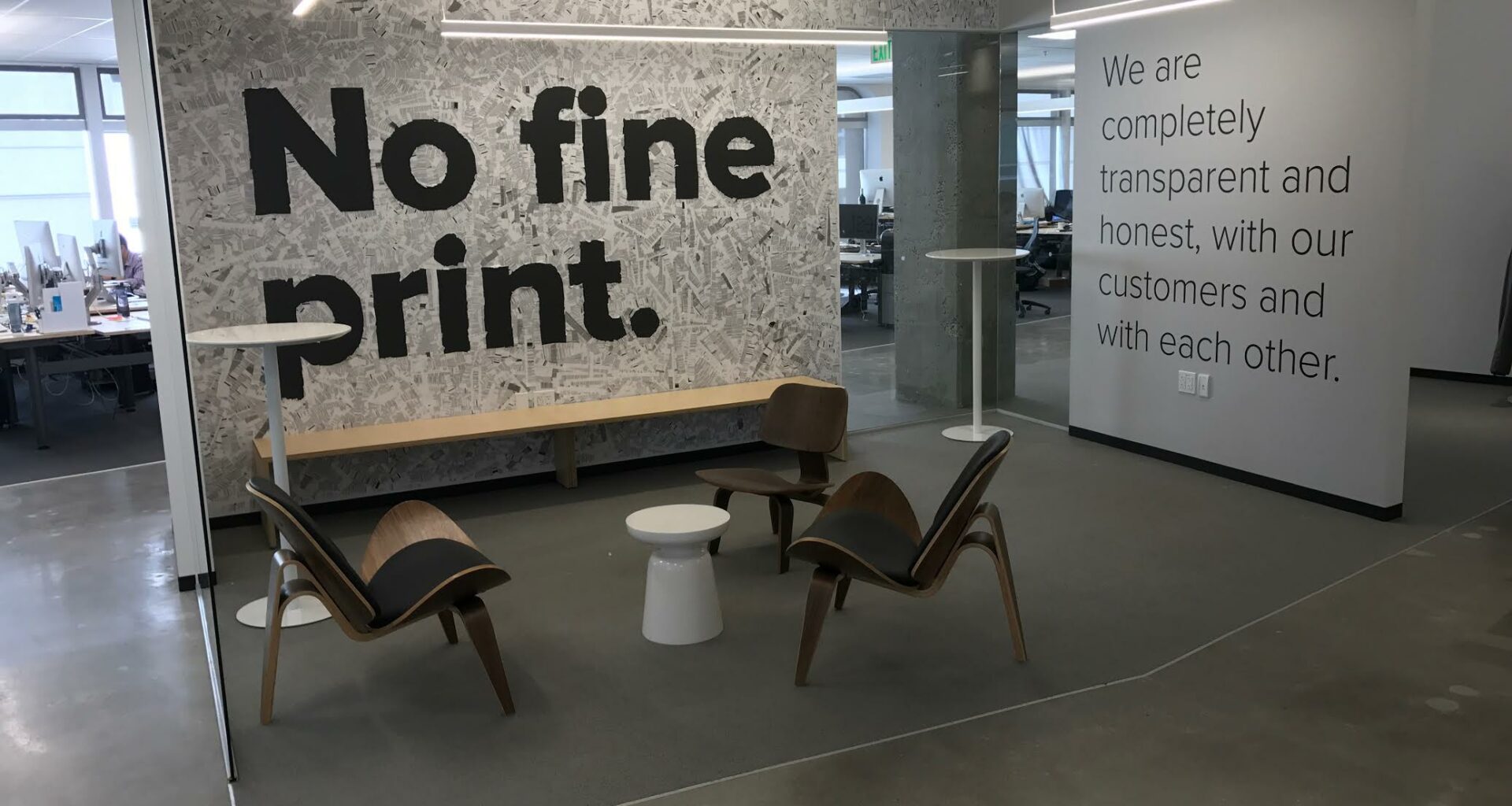No fine print.
It was a few months after I started my new job at Affirm, when I noticed this literally plastered on the hallway walls leading to the company kitchens. Out of our set of company’s values, this principle is particularly multifaceted: it applies both to the team’s internal conduct, but also to how the product differentiates itself, via the disclosures up front stating its full cost absent any industry-standard fees. No fine print is a statement of transparency and trustworthiness, both to consumers and to ourselves.
Affirm is a startup founded in 2012 on the idea of providing more ways for customers to access credit; eventually, the team converged on customer loans at e-commerce points of sale, and really focused on serving that need. When I joined in 2017, there wasn’t much industry recognition that this type of installment loan would be an impactful payment category. By the time of this writing in 2020, though, it has evolved into its own subcategory of financial service, with the awkward moniker of “buy now, pay later” (BNPL) and enough entrants to both validate and compete for the rapidly expanding market.
But that core company value above, and our mission, was really what drew me to working for Affirm. In fact, I ended up incorporating it into my sell calls and hiring pitches1; here’s the gist:
- The premise of FinTech, generally, is to apply technology to financial services, automating previously manual processes.
- That efficiency is translated into advantages in speed and/or cost, which enables small startups to compete—and succeed—against well-capitalized banks and bigger players.
- More business generates more revenue and profit margins. Companies can choose to take those profits for themselves, or reinvest into serving more customers.
- Since everyone frames their mission statements to be democratizing finance, the true mark of living up to those lofty ideals is to acknowledge and repeatedly make the tradeoff to serve new markets, at the expense of making more money.
Incidentally, this was precisely the litmus test that came across my team early in my tenure, right about the time the office folks physically manifested our values as a daily reminder. At the time, our CEO wanted to test how our customers would respond if we were to start charging late fees, and my team was teed up to implement an A/B-test to gather data. One of my engineers felt strongly that even exploring the idea was just against our company values, that regardless of how it’d change the calculus on a customer’s expected value to Affirm, that it’d just be the wrong feature to build. I credit Max for taking the input thoughtfully, asking tough questions, and then agreeing to do the right thing for the customer even when it made issuing loans a more difficult underwriting problem. Years later, he ended up doubling down on this philosophical pillar.
This is the hill that Affirm has chosen to climb, the consumer lending space which is fraught with poor customer experiences and at times, outright cynicism. Despite repeated, quantified customer satisfaction, we get accused of payday and predatory lending. We have to repeatedly explain that without fees, our business model is fundamentally different, that we have to align ourselves with our customers since their ability to pay back the loan is the primary determinant of success. Affirm’s impact will be realized when the entire lending industry shifts away from an antagonistic relationship with its customers to that of a cooperative one; sadly, there are still a ways to go.
Similar to my time at Square, I was very fortunate to have grown with the company as it scaled up in size, on both the team and business fronts. This go around, I validated my past experience at a hypergrowth startup. I’m now even more appreciative of the opportunities to scale yourself as the business and team scales, confirming that the rapid pace of change enables outsized personal and professional development. As I joined as a more senior leader, I was treated to a first-hand experience to the types of people, processes, and programs required at each stage of a startup’s lifespan; even more importantly, I gained a better understanding of why and how to transition to new systems as the team scaled. In tackling some of these issues, I gained more confidence in my own management capabilities, and my writing on this topic these past 3 years has commensurately increased.
Of course, it also helps to be surrounded by capable managers and leaders. In my time with Affirm, I felt like we struck the right balance between hiring for the expertise we needed, versus promoting talent from within. Contrasting it with organizations I’ve worked for in the past which heavily favored one style over the other—in both directions—and I’ve come to appreciate that this is a surprisingly difficult compromise. This challenge is further compounded by aggressive team growth, which has a tendency to surface skill and team gaps too late. I was proud of how our engineering team often forced ourselves to do the hard managerial work, recalibrating and uncovering inconsistencies and fixing them, and in doing so set an exemplary standard for other functions.
So, what’s next for me? For the first time since college graduation, I have nothing lined up! It’s both liberating and frightening, particularly with the economy still on shaky ground and the pandemic still forcing everyone to stay physically isolated, to have little certainty to future job prospects. That said, in even this short month away from Affirm, I’ve already gotten many kind referrals and offers for help. There is a surprising amount of startup and tech industry activity, and I’ll be on the lookout for teams that I think my skillset can provide value. Meanwhile, I’ll keep myself busy—reading, blogging, and virtual schooling with my kids.
Delightfully, I’ve had folks reach out when our professional connection was solely through interviewing at Affirm, so I have some evidence that this resonates.↩




